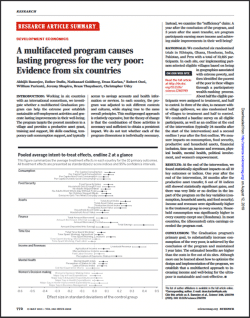
Policy highlights:
- To eradicate extreme poverty, development organizations and governments are seeking pathways to more effectively target the poorest people, who are often the most difficult to reach.
- One popular avenue is the promotion of self-employment activities. This paper presents results from randomized control trials (RCTs) conducted in six countries. It seeks to determine whether a multifaceted graduation programme can help the poor establish sustainable self-employment activities and generate lasting improvements to their wellbeing.
- The programme, which was implemented in Ethiopia, Ghana, Honduras, India, Pakistan and Peru, targets the poorest members of a village with a productive asset grant, training and support, life-skills coaching, temporary cash consumption support, and access to savings accounts and health services.
- One year after the end of the intervention 80% of beneficiaries still enjoyed significant gains and there was little decline in impacts in terms of consumption, earnings, self-employment and assets.
- Hence, to effectively release people from the poverty trap, policymakers are advised to take a multifaceted approach that combines cash transfers with training.










